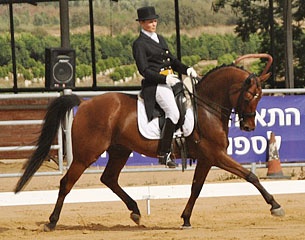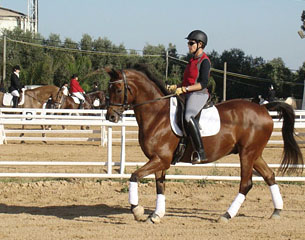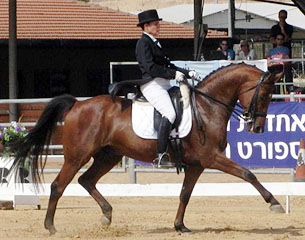
Imagine having the talent and the desire to compete international, but being unable to because of the political state of your nation. Three time Israeli dressage champion, and winner of the Israeli FEI World Dressage Challenge, Sivan Sat gets hope for a brighter future in her country through the sport of dressage.
"Israel is a tiny country, so the most we have to drive to get to competitions is around 2 - 2.5 hours," Sat told Eurodressage. "I wish very much that we could trailer our horses just a few more hours and compete in nations such as Greece, Turkey, Lebanon, or even continue all the way to Europe! Unfortunately, until we end this ongoing rivalry with our neighbour countries, this will not be possible. The borders are closed for us to trailer horses."
Having grown up in a kibbutz, 48-year old Sivan was born in Israel and got into horses through her father.
"My dad had horses and I started to ride bareback when I was about 8 years old. The kibbuzt was the perfect place for horses. It was a community with no private property. My Kibbuzt bought a couple of horses in so we kids could learn to ride. Within a few years the stable grew and more kids joined in. Of course the horses did not belong to any of us, but to the community."
Introduced to dressage and jumping when she was 16, Sivan did both until she was 33, but dressage was what she truly loved.
"I purchased my first "real" dressage horse, a Bavarian warmblood named Firemoon, when I was 28 and I won the Israeli championship on him in 1995. I also won the FEI World Dressage Challenge with him the same year."
A member of the Israeli Dressage Committee, Sivan spent two years as chairperson and is now a board member of the Israeli Equestrian Federation.
"The Israeli Equestrian Federation (IEF) was founded in 1964. It is the only body in Israel that governs the equestrian sports and is recognized as such by the Israeli sport institution and the ministry of Sport and Education. The IEF is funded by its members and with money from the Israeli Lottery - Pais institution, and is recognized by the FEI. Our federation is growing all the time, mainly due to the recent introduction of more competitions designed for both the young and beginner riders," Sat explained.
Asked if due to the size of the Israeli federation, there is a good relationship amongst members, Sivan says "well, we should be friends", but adds that distance gets in the way.
"The problem here is that we are so isolated that we have only ourselves to count on. We work together but not enough. We need to do more clinics and seminars, volunteer, and so on. It's the only way we can keep our sport moving forward. There are quite a few very good trainers in Israel, but they need to cooperate with each other more, organize clinics, share their knowledge with others."
 With 12 official shows in Israel over the show season, competitions commence this year in September 2012 and will end in June 2013.
With 12 official shows in Israel over the show season, competitions commence this year in September 2012 and will end in June 2013.
"We have a 2 month break in the middle of that time, over January and February, as there is just too much rain. And we don't compete in the summer because it's way too hot! However, we still manage to host 4 major competitions: FEI World Dressage Challenge, Dressage Cup competition, Riding schools team and individual Championship, and the National championship. All of these, except the riding school championship, are judged by international judges that we invite in from Europe. The shows that qualify riders for those championships are relatively big, and we often receive around 200 entries."
One special event, the Macabia Games in Israel, will be held next July and it will be the first time that equestrian sports will take part in this unique event.
"Dressage and show jumping riders from Israel and around the world will compete in it. It's a big event in our standards!"
Aside from the border issues Israel's distance from Europe and the country's isolation make it that much more difficult to train and compete at a top level.
"The fact is it is practically impossible for us to compete in Europe or North America unless we actually live there."
Despite all that, Sivan has been lucky enough to benefit from some world class training and the growth of dressage in Israel is giving hope to passionate riders like herself.
"My first serious dressage training was in Holland with Carl Eikanaar. He was a long time student of George Theodorescu and had his own training facility in Oosterbeek near Arnhem. Then in 1997 my family and I moved to the USA and stayed there for almost 12 years. There I was able to train regularly, (in clinics), with Lars Petersen, Patrick Brussens, and Nancy Later. My family moved back to Israel in 2008."
Now sadly Sivan is currently working solo, but takes every opportunity to get help when she can.
"I don't have anyone I work with regularly, unfortunately, but once in a while I take lessons from Dany Mayer, a former Israeli guy who lives and trains in Germany. He comes to visit his family in Israel. I attend clinics of Eddy De Wolff van Westerrode, an FEI 3-star judge who visits in Israel quite often."
Riding between 1 to 4 horses per day, Sivan's own horse Tempest (aka Bob) was a Swedish warmblood (by Amiral) that she bought in the States and trained herself to Grand Prix level. To her great despair he had to be euthanised last June, due to complications during colic surgery.
With a few horses currently in training at a stable in Kibbutz Ramat Yochanan, near Haifa, in northern Israel, Sivan mainly trains warmbloods of various levels.
 "Years ago our country had mainly Arabians and mixed breeds, such as Arabian x Thoroughbreds crosses, but in recent years you see more and more warmbloods in the sport in Israel. They are imported mainly from Holland and Germany, but also from the States and Eastern Europe. One Warmblood that I'm going to show this year will probably do Fourth level."
"Years ago our country had mainly Arabians and mixed breeds, such as Arabian x Thoroughbreds crosses, but in recent years you see more and more warmbloods in the sport in Israel. They are imported mainly from Holland and Germany, but also from the States and Eastern Europe. One Warmblood that I'm going to show this year will probably do Fourth level."
Hoping to continue to teach and train riders and horses long into the future, Sivan wishes she had a place in Europe that she could visit more regularly, but knows her first step is to buy and start a young horse, and also help inspire others from her country to take up the sport.
"Dressage in my country is developing slowly all the time. We have interesting programs for young riders, one of them is the Athena Project. It's basically a Ministry of Education funded project that supports and develops young female athletes in different sports. The IEF was chosen to participate in the project and received a grant to support 4 young female riders in dressage and 4in show jumping, who were selected from their age group (under 16) based on the level they are showing. The higher the better. The girls had and will have several riding clinics, 2 of them in Europe, and the others in Israel."
While governmental political conflict blocks their borders, Sivan says there is hope and some great trainers and riders are finding their way back to Israel, after they have been successful competing and training in Europe or the US.
"My personal wish is that the conflict with our neighbours will end soon, and we can start to travel and compete against riders from different countries. Isn't that a dream?"
by Sarah Warne
Related Links
Jewish Riders Sought to Represent USA at 19th World Maccabiah Games
Israelian Olympic Committee Refuses Oded Shimoni's Olympic Participation
Constance Menard to Ride for Israel